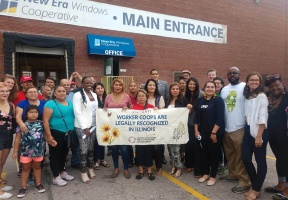
Mujeres Brillantes de La Limpieza LWCA, Cook County Commissioner Alma Anaya, 10th ward Alderwoman Susan Sadlowski-Garza, Centro de Trabajadores Unidos: United Workers’ Center (CTU) and allies gathered on Monday at City Hall to support the launching of its first cleaning worker cooperative. A worker owned cooperative provides an opportunity for all worker owners to share the same responsibilities, profits and work ethics in an attempt to create alternative economies. The effort to expand and form new worker cooperatives is being led by women and people of color. A study conducted by the Illinois Worker Cooperative Alliance (IWCA) found that worker cooperative businesses are an emerging sector of the economy. More than sixty percent (60%) of worker cooperatives in operation have been formed since 2000. Nationally, roughly sixty-six percent (66%) of all current worker-owners are women; and since 2010, sixty percent (60%) of new worker-owners are people of color. (Cooperation Chicago: Building Chicago’s Worker Cooperative Ecosystem, 2018)
As worker cooperatives create living-wage employment opportunities for low and moderate- income and marginalized workers, IWCA believes that fostering the growth of the worker cooperative ecosystem is the single most important thing that the City of Chicago, Cook County, and the State of Illinois can do to address worker exploitation and inequality, while promoting economic stability and community wealth building. The Illinois Worker Cooperative Act became effective in January 2020, right before the State of Illinois went into closure as a result of the COVID-19 pandemic. The Illinois Worker Cooperative Act 1) creates a new business entity better suited for worker co-ops, 2) allow for businesses to assert themselves as worker co-ops under State statute, 3) enshrine co-op values into the business form, 4) allow co-ops to raise capital without the burden of costly securities registration, and 5) creates access for worker-ownership for low-moderate income entrepreneurs, formerly incarcerated individuals and immigrant communities in Illinois.











